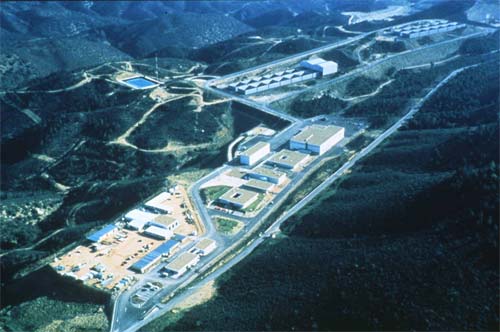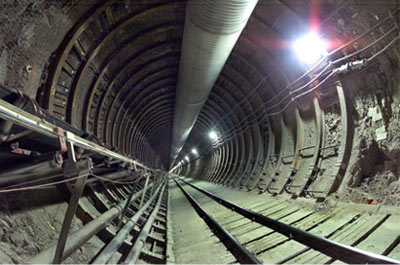Overview of waste management strategies outside France

Spanish low-level waste (LILW-SL) repository
Waste repository in El Cabril, Spain. This low and intermediate-level short-lived waste repository located in the northwest of the Cordoba province has been operating since 1992.
© ANDRA
Management of the least radioactive waste is the most advanced, both in France and in other countries. Several countries operate waste repositories similar to France’s CSA and CSM facilities for low- and intermediate-level short-lived waste (LILW-SL).
Most of these are above-ground facilities. Others are near-surface underground installations, such as the SFR repository in Sweden, which has been excavated from the surrounding granite at a depth of around 50 m. In 1992 and 1998, Finland opened two near-surface underground repositories built adjacent to two nuclear power plants. In the United States, the chosen option is near-surface disposal following above-ground interim storage.
Management strategies for intermediate-level long-lived waste (ILW-LL) are less advanced. In the United Kingdom, waste is stored at the site where it was produced. Only a small proportion of waste has been conditioned. In Japan, waste will be disposed of in Rokkasho-Mura, in an underground repository at a depth between 50 and 100 m.

US project towards a final disposal of high-level waste
This main access tunnel extending out of sight gives an idea of the scale – as befits a world superpower – of the planned Yucca Mountain repository. The project, located under a mountain in Nevada, was abandoned in 2009. For the time being, spent fuel and military waste will remain in interim storage, either near reactors or at specialised facilities.
© DOE
Much less progress has been made in the area of high-level waste management. There is a consensus among experts in favour of deep geological disposal, a solution which they consider to be necessary, feasible and in principle safe. Most projects have not yet moved beyond the geological formation assessment phase. They face public acceptability issues and are subject to parliamentary and in local approval. For example, France had to give up studies on granite formations owing to local protest movements, and base its studies of this option on results obtained for granite in Scandinavia, where this type of research was accepted.
In these « wait and see » conditions, interim storage is the rule in all countries concerned by such issues. Such facilities enable spent fuel or waste to be stored and monitored until a geological repository is available. They allow radioactive materials to cool. Spent fuel may be stored at power plants or centralised at large facilities. A combination of the two approaches is also possible. The technical solutions relating to conditioning and interim storage of radioactive materials and waste in safe, monitored facilities are similar from one country to another.
Countries that reprocess their spent fuel also hold vitrified waste in interim storage in dry facilities. This applies to Japan, in particular. Germany is in an intermediate situation: the country stopped reprocessing in 2005, and must henceforth store its spent fuel near to its plants. It also keeps vitrified waste in interim storage.
Together with its Finnish counterpart, the Swedish project is the most advanced of all European projects, having succeeded in building a remarkable and much-envied consensus. This project has now reached the stage of choosing between two potential repository sites accepted by the population.
The United States were expected to become one of the first countries to have a repository, through the huge Yucca Mountain project in the Nevada desert. However, this project was abandoned by the Obama administration. The United States are back to square one, storing their waste near their power plants throughout this huge country. In 2012, the blue ribbon commission was scheduled to issue its opinion on the nuclear cycle in general, and final disposal of waste, in particular.
Other articles on the subject « Waste management »
Waste management status
Repositories already in operation for low-level waste Compared with other types of waste, the mas[...]
Other storage facilities
Interim waste storage according to their nature and origin Spent fuel and vitrified waste from Pr[...]
Temporary storage
A temporary solution Interim storage is a temporary solution that plays a central role in the man[...]
Vitrified waste Storage
Dry storage of vitrified waste Spent nuclear fuel assemblies are not the only materials removed f[...]
Spent fuel storage
Interim storage in pools and then dry locations In all countries, spent fuel management begins wi[...]
LILW-SL waste repository
Disposal of low and intermediate-level short-lived waste Low and intermediate-level short-lived w[...]
VLLW repository
An operational repository for very low-level waste The second category of waste for which a repos[...]
High level waste transportation
Moving highly radioactive materials The 10% of transport movements that concern high-level radioa[...]
Transport safety
Measures to ensure safe transport Nuclear materials may be highly radioactive. The goal is to pre[...]
Transport-related incidents
Incidents but no accidents… Have radioactive material transport operations caused any accid[...]